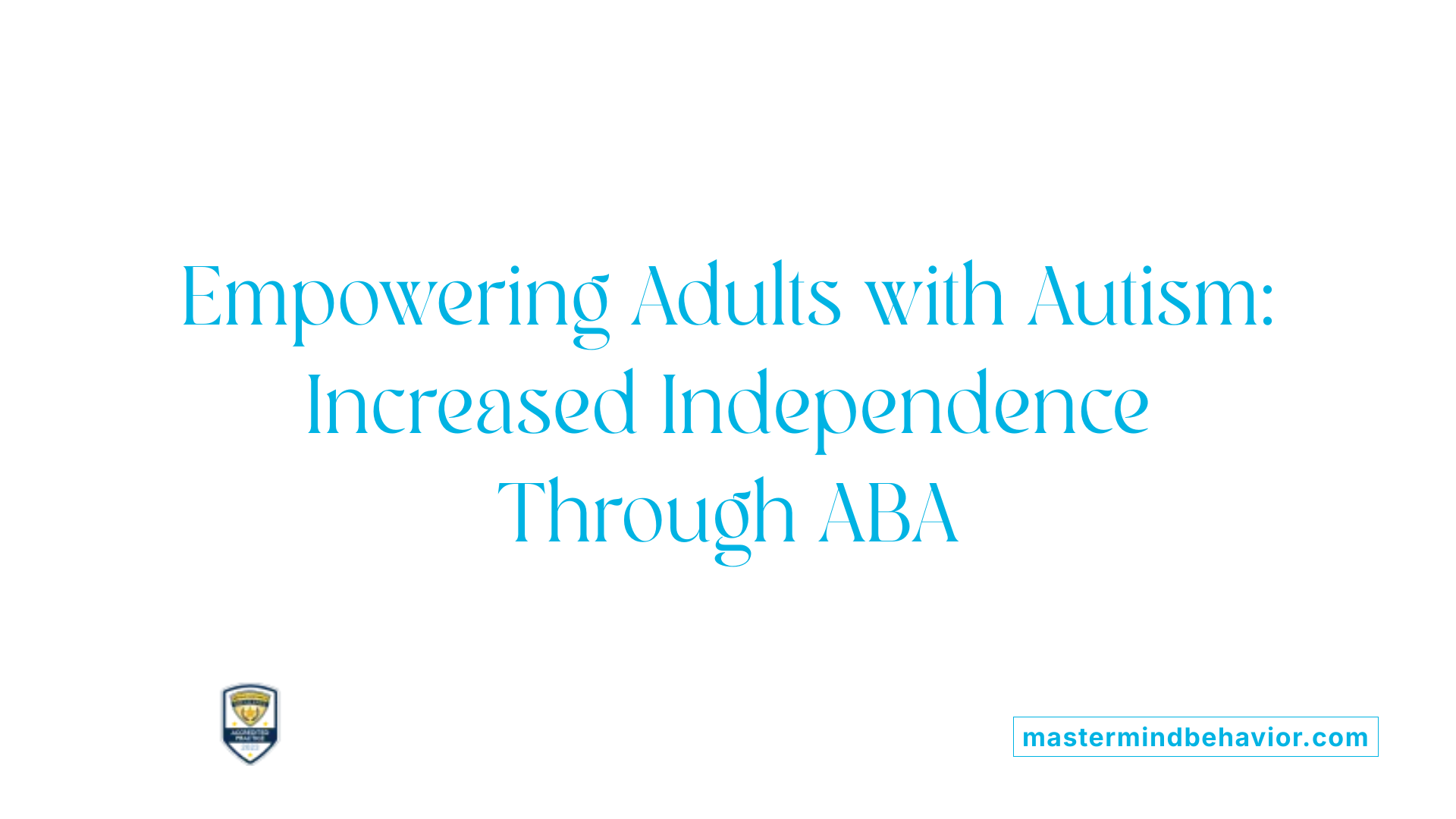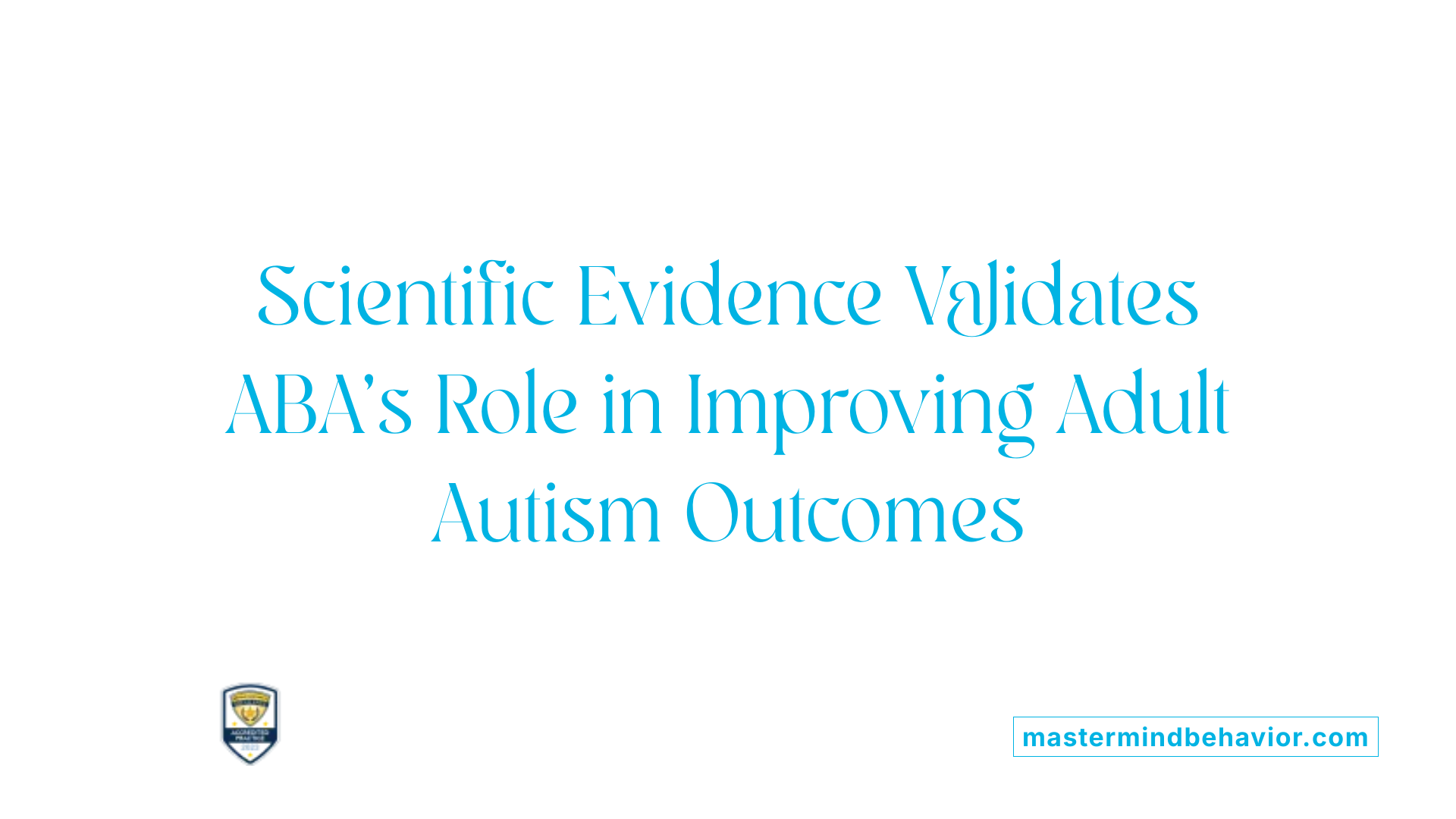Understanding ABA Therapy and Its Core Principles
Applied Behavior Analysis (ABA) is a scientifically grounded therapeutic approach that focuses on understanding and modifying human behavior through the principles of learning and environmental influence. Originally developed for young children with autism, ABA’s core principles are equally applicable to adults, offering a structured, evidence-based means of fostering independence and improving quality of life across the lifespan.
What is ABA Therapy and Its Core Principles

What is ABA therapy and what are its core principles?
Applied Behavior Analysis (ABA) therapy is a scientific approach that aims to understand how human behaviors work and how the environment influences those behaviors. It is widely used as an effective treatment, especially for individuals with autism spectrum disorder (ASD), but it also applies to people of all ages.
ABA therapy focuses on increasing helpful behaviors and decreasing those that may hinder progress or cause harm. It examines the relationship between behaviors and environmental factors using the ABCs—Antecedent, Behavior, Consequence. This analysis helps identify what triggers certain behaviors, what the behavior itself looks like, and what happens afterward, which in turn influences future responses.
The core principles of ABA include positive reinforcement, where desirable behaviors are rewarded with meaningful incentives to encourage repetition. Techniques like task analysis break down complex activities into smaller steps, making skill acquisition manageable. Data collection and ongoing assessment ensure that interventions are effective and tailored to individual needs.
A trained professional, often a Board Certified Behavior Analyst (BCBA), designs personalized programs based on detailed assessments of the person's skills and preferences. These programs can be implemented in various settings such as at home, school, or community environments, and usually involve direct instruction, caregiver training, and social reinforcement strategies.
Research consistently shows that intensive ABA therapy—especially when started early and with sufficient hours—is capable of substantially improving language, social interactions, independence, and daily living skills. Its evidence-based foundation makes it the standard treatment for autism, supporting meaningful progress through scientifically validated methods.
Increasing Independence and Enhancing Daily Functioning in Adults with Autism

How does ABA therapy benefit adults with autism in increasing independence and improving daily functioning?
ABA (Applied Behavior Analysis) therapy offers valuable support to adults with autism by targeting essential skills required for independent living. It is designed to enhance communication, social skills, self-care, and everyday activities. Through tailored, data-driven approaches—including positive reinforcement, modeling, and task analysis—ABA helps individuals learn to manage finances, carry out job-related tasks, and regulate their emotions.
One of the main strengths of ABA is its flexibility in different environments. Therapy can be implemented at home, in the workplace, or within the community, allowing adults to practice new skills in real-life situations. This practical approach aids in generalizing learned behaviors, making them more applicable outside the therapy setting.
Challenging behaviors, which can hinder independence, are also addressed through ABA. Practitioners identify triggers for harmful actions and develop replacement behaviors that are more adaptive. Techniques such as relaxation training and emotional regulation strategies help improve mental health and emotional well-being.
ABA's focus on daily routines and life skills supports adults in achieving greater self-sufficiency. Whether it’s managing personal hygiene, cooking, or using public transport, ABA methods like task analysis break complex activities into manageable steps.
However, ongoing discussions by the autism community highlight the importance of ethical practices and listening to autistic adults' perspectives. While ABA can significantly boost independence, it is essential to ensure that therapies are respectful, person-centered, and incorporate input from those they aim to serve.
Overall, ABA promotes greater autonomy by systematically teaching practical skills and improving behavioral challenges, thus enhancing the overall quality of life for adults on the spectrum.
Evidence Supporting the Effectiveness of ABA in Adults with Autism

What evidence supports the effectiveness of ABA therapy for adults on the autism spectrum?
Research on ABA (Applied Behavior Analysis) has established it as a well-supported intervention method for individuals across all age groups, including adults. A number of peer-reviewed studies and systematic reviews have demonstrated that ABA can produce positive changes in various areas crucial to adult independence and well-being.
For example, many studies focus on core issues such as communication, social skills, and behavior management. Results generally show improvements in functional communication, social interaction, and reduction of harmful behaviors. Effect sizes from these studies, which measure the magnitude of change, range broadly but consistently point to meaningful gains.
A pivotal study from 1987 by Lovaas laid the groundwork by showing that early intensive ABA therapy could lead to significant developmental improvements. Although early intervention is ideal, current research confirms that adults also benefit from customized ABA programs. In adults, ABA techniques are tailored to enhance life skills, improve social participation, and foster greater independence.
Health authorities and professional organizations recognize ABA as an evidence-based treatment for autism. This endorsement is based on a growing body of scientific evidence supporting its efficacy in improving day-to-day functioning and quality of life.
While much of the initial research focused on children, recent studies and reviews indicate that ABA can effectively address many adult-specific needs. These include teaching workplace skills, managing emotions, and developing self-care routines.
Overall, current scientific evidence supports the use of ABA not only for children but also for adults with autism, demonstrating its potential to improve various key areas and enable more autonomous and fulfilling lives.
Applying ABA Across the Lifespan and Various Settings

Flexibility across age groups
ABA therapy is highly adaptable and can be utilized effectively across all ages. While it is most renowned for its success with young children, especially those aged 2 to 6, its principles are equally beneficial for adolescents and adults. Early intervention, particularly before age 4, can lead to substantial improvements in communication, social skills, and overall development. Starting ABA therapy in infants as young as 6 months, using methods like the Early Start Denver Model, supports early social communication growth. Nonetheless, even later in life, individuals with autism or other behavioral challenges can benefit from tailored ABA strategies. The therapy’s flexibility allows professionals to design programs that address the specific needs of each individual, regardless of age.
Supporting Adults in Various Environments with ABA

How can ABA therapy support adults with autism across different settings?
ABA therapy is a versatile and evidence-based approach that can be tailored to meet the specific needs of adults with autism in diverse settings such as home, work, community, healthcare facilities, and residential care.
In each of these environments, ABA techniques include positive reinforcement, task analysis, role-playing, and real-world practice to help individuals improve their daily functioning. For example, at home, ABA might focus on teaching self-care routines or managing household chores. In the workplace, it can target skills like task completion, teamwork, and stress management to promote employment stability.
Within community settings, ABA helps adults develop social skills and navigate social cues more effectively, leading to better community integration. In healthcare contexts, it can assist in managing challenging behaviors or emotional regulation issues, such as anxiety or self-injury.
Every ABA program begins with a thorough assessment to identify individual strengths, goals, and challenges. This information guides the creation of personalized plans, which include specific strategies and reinforcement tools tailored to each environment.
Progress is continuously monitored through systematic measurement, allowing practitioners to make necessary adjustments. This ongoing evaluation ensures that interventions remain relevant and effective across different settings.
A significant aspect of ABA for adults is empowering them with useful life skills—like managing personal finances, cooking, or using public transportation—which fosters independence.
Moreover, ABA helps reduce problematic behaviors that can interfere with daily life, supporting a higher quality of life and greater autonomy.
By applying its structured and adaptive methodologies, ABA therapy enables adults with autism to enhance their functional abilities, improve social interactions, and achieve greater participation in community life, no matter the setting.
Health, Social, and Daily Benefits of ABA for Adults
What specific benefits does ABA therapy offer to adult individuals with autism regarding health, social skills, and daily functioning?
ABA therapy provides a wide range of improvements for adults with autism, focusing on enhancing their ability to communicate, socialize, and manage daily activities independently. Through personalized intervention plans, adults can develop better verbal and non-verbal communication skills, making it easier to express their needs and connect with others.
Social skills are also a key focus, with ABA teaching adults to recognize social cues, engage in social interactions, and build meaningful relationships. Such training often involves practicing real-life scenarios to prepare individuals for social situations at work, in the community, or within their families.
Daily living skills see substantial growth through ABA strategies. Adults learn to handle routines like cooking, cleaning, managing finances, and personal hygiene—crucial steps towards independence. Techniques like task analysis break down complex activities into manageable steps, facilitating skill mastery.
Emotional regulation is another important aspect supported by ABA. Strategies such as relaxation training and mindfulness help reduce anxiety and emotional distress, contributing to better mental health.
In the professional sphere, ABA equips adults with workplace skills, including task completion, communication, teamwork, and stress management, which improve job retention and satisfaction.
Health and wellness are promoted by encouraging healthy habits—exercise routines, proper nutrition, and hygiene practices—integral for overall well-being.
Furthermore, ABA supports mental health by teaching coping mechanisms for stress, anxiety, and depression, which are common challenges among adults with autism.
Overall, ABA therapy aims to foster greater independence, social engagement, and emotional stability. By addressing specific needs through evidence-based techniques, it enhances quality of life and promotes self-sufficiency across various aspects of daily living.
Walking the Path to Greater Independence and Well-Being
In conclusion, ABA therapy offers a well-established, adaptable, and effective approach to supporting adults with autism. By focusing on developing essential life skills, reducing challenging behaviors, and enhancing social and emotional well-being, ABA contributes significantly to increasing independence and improving overall quality of life. While ongoing discussions about ethics and trauma are important, the current body of scientific evidence underscores ABA’s role in empowering adults on the spectrum to lead more autonomous, connected, and fulfilling lives. As research continues and practices evolve, ABA remains a vital tool in fostering better outcomes for adults with autism across their lifespan.
References
- Applied Behavior Analysis (ABA) | Autism Speaks
- What can ABA offer young adults with autism?
- ABA Therapy and How Can it Help Children and Adults with Autism
- Autistic experiences of applied behavior analysis - PubMed
- A Systematic Review of Psychosocial Interventions for Adults with ...
- Ways ABA Enhances Health and Independence for Autistic Adults
- ABA Therapy for Adults: Benefits and What to Expect








